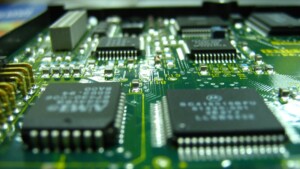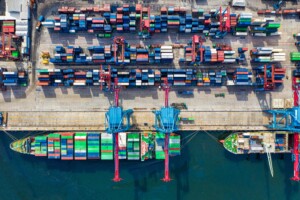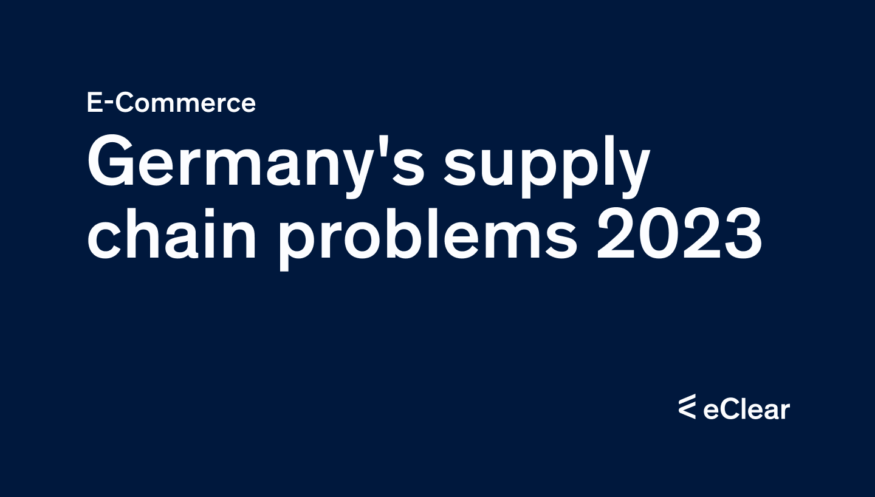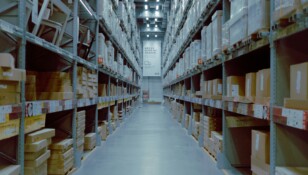The supply chain problem of the global economy has a tight stranglehold on the EU wildly, since the local economy in Germany is groaning. Global effects of the COVID-19 pandemic, international trade conflicts, Suez Canal blockade or shortages of semiconductors and other raw materials have led to global companies struggling to maintain production and meet delivery deadlines.
The German automotive industry, which plays a vital role in the European economy, has been affected by these challenges and is bracing itself for a tricky 2023 fiscal year. The need for semiconductors, which are needed to produce electronic components in vehicles, has led to car manufacturers having to cut back or even stop production. This, in turn, also impacts the supplier industry, which in turn supplies other sectors.
The dependence on semiconductors

© Pixabay
The semiconductor industry, meanwhile, is booming as digitalisation penetrates all aspects of life and the demand for microelectronics increases. According to an analysis by McKinsey & Company, the global semiconductor industry could become a trillion-dollar industry by 2030, with annual sales growing by 6-8 %. Digitalisation and megatrends such as artificial intelligence, electric cars and home offices will drive demand for semiconductors. Three growth areas are semiconductors for automotive, computing and data storage, and wireless communications. The automotive sector is expected to grow at 13-15 % annually.
Other sectors, such as the construction industry, also suffer from the building materials’ shortage. The increasing demand for wood and other raw materials has led to price increases and delays in delivery.
The supply chain problems also affect the retail sector – many shops need help maintaining stock levels as some deliveries are delayed or cancelled. This has led to shortages of certain products and higher prices, another stress test for end consumers who have to cope with further price increases

© Pexels
the favourite yoghurt just not available on the shelf? Bygones be bygones, one might think, but the effects have reached a level that can cause health problems; foremost, the acute supply shortages in human medicine – especially children’s cough syrups or antibiotics are hardly available at the moment. With far-reaching consequences, also for the pharmaceutical industry.
An unreliable supply chain can have negative consequences for manufacturers, such as significant sales losses or reduced market opportunities in the future. Therefore, all manufacturers strive to avoid potential supply bottlenecks using reliable production facilities, accurate demand assessments and careful stockpiling.
Chip manufacturer TSMC – the most powerful company in the world?
So much for the current, more or less solvable part of the problem, the Europeans, nay the world, are also looking with growing concern at the development of the tense relationship between the People’s Republic of China and Taiwan: the smouldering conflict could develop into a new flashpoint of war soon and call the Americans onto the scene. Third World War horror scenarios included.
Worse still, the military threat to Taiwan from China poses an economic danger to the world economy. After all, as an industrial nation, we in Germany depend on the world’s semiconductor production centre, TSMC (Taiwan Semiconductor Manufacturing Co). But who exactly is this company?
Founded in 1987 in Taiwan’s Hsinchu science park, TSMC has advanced to become a global player. Capital.de notes in an article from 2021 that without TSMC, the world would be facing a global recession of unimaginable proportions:
“No other company manufactures as many semiconductors year after year as TSMC; no one else has the know-how to produce the most advanced chip generation, and no competitor has continuously managed such high-growth rates over the last 20 years. The components from Taiwan are machines and cars, aeroplanes, computers, smartphones, and medical devices. A sudden failure of TSMC’s factories would plunge the world into the deepest recession of the post-war era. No other single company in the world has the same importance as TSMC. On Taiwan, the highly profitable company is even seen as a geostrategic “lifesaver”: the hostile People’s Republic of China, which repeatedly threatens military conquest of the island, would suffer from the destruction of the TSMC factories more than almost any other country and may therefore also so far be reluctant to invade.”
German government promotes semiconductor production facilities
And rumours from Saxony are to be believed. In that case, the German government around Olaf Scholz is already negotiating to build a TSMC plant in Germany and import the know-how into the country. Observers, however, believe that this move is a forerunner of deglobalisation. Whether this is true or not remains to be seen. The fact is, however, that the German government is trying to reduce dependencies. It has announced that it will continue to promote expanding domestic production of semiconductors and other raw materials.
On Tuesday, 2 May 2023, an essential moment for Germany’s semiconductor industry occurred when the groundbreaking ceremony for the new Infineon chip factory in Dresden occurred. It was a historic step, accompanied by many people. Among the guests was the German Chancellor and EU Commission President Ursula von der Leyen from Brussels. She stressed the importance of more projects like this in Europe to meet the rapidly growing microchip demand.
In addition, the German government plans to reduce dependence on supplies from abroad by strengthening cooperation with other European countries.
However, it remains to be seen how quickly the situation will improve. Supply chain issues are a complex problem that will take time to be solved. It will require the cooperation of companies, governments, and international organisations to find a sustainable solution. At the very least, however, the Supply Chain Act will help minimise problems by requiring companies to monitor their supply chains in the future and ensure that they meet applicable standards. By implementing the Supply Chain Act, companies will be able to better identify and manage risks in their supply chains to improve the stability and sustainability of their supply chains.







